Farmer John Writes: Organic Inspection Inspection
Harvest Week 19, October 12th – 15th
If You Have a Half Share and No Extended Season Share
If you are shareholder receiving your every-other-week half share this week, and you do not have an extended season share, this week’s delivery is your last of the season. Thank you for being a shareholder with us this year. If you are unsure what share types you have, log in to your membership at www.angelicorganicsfarm.csasignup.com/login.
Your Box This Week – Saturday, October 15th
Please note: this summary is written before we pack your box—be aware that some guesswork is involved. At times, a bit of improvisation is required for selecting the contents of your share. As always, be sure to thoroughly wash all of your vegetables.
- Butternut Squash
- Eggplant
- Ear of Popcorn (find popping instructions further below)
- Bunched Kale
- Purple Choi
- Potatoes
- Lettuce
- Baby Choi
- Onion (please read about your onion further below)
- Garlic
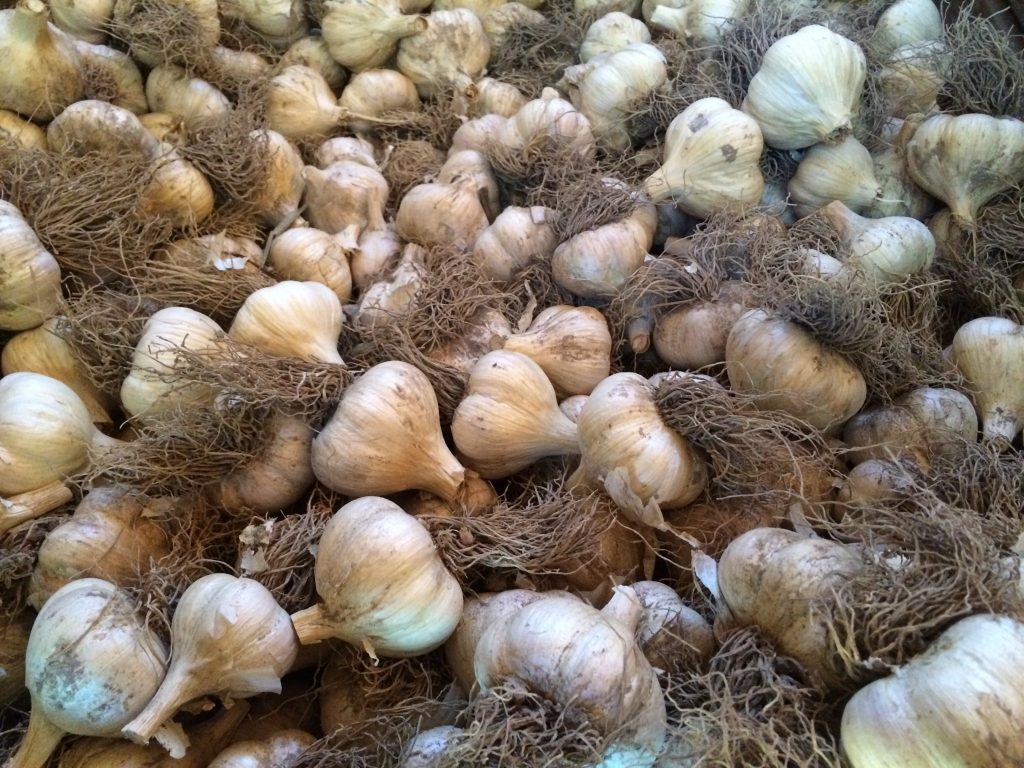
Garlic
Popcorn
Your popcorn might be dry enough when you receive it to pop right away, or you might need to husk the ear and let it dry on your counter for a while. Some people pop it on the cob in the microwave, with kids watching through the appliance window. Some shell it and pop it in a frying pan or popcorn popper.
Careful of Your Onion
The onions were a disappointing crop this year. We sorted through the onions in storage as thoroughly as possible, but please inspect your onion when you cut into it, as there might be some interior spoilage that we didn’t find when sorting.
Time
It’s Monday night and I’m just beginning this newsletter column. I almost always finish the newsletter on the weekend before the Tuesday it is printed; I’m usually done with it on Saturday. This weekend, however, there were too many work-related things going on, so here I am, thinking about time, about being late. For those of you who have been with us for a while, when I was on the film tour and Bob did the newsletter, it would usually get done about 2 a.m. on Tuesday morning. I always cringed when I heard this. Many years back, when Kimberly Rector did the layout and art work for the newsletter, she would work on it through the night barely getting it done by sunrise; then she’d try to farm the next day. I panic when I am late; I go to great lengths to get things done on time, ideally ahead of time, which leads me to the Brussels sprouts.
Brussels Sprouts
For the last many seasons, the Brussels sprouts have come on uncomfortably late in the season, causing me often to wonder if there would even be Brussels sprouts. This year, determined to avoid that prospect, we seeded the Brussels sprouts two weeks earlier than ever before, transplanted them two weeks earlier than ever, and then topped them–to encourage the sprouts to form–and stripped the bottom leaves–to discourage blight–probably three weeks earlier than ever. So, do you wonder where your Brussels sprouts are? They are later than ever this year. I keep visiting them, wondering if they are going to adequately form at this late date. Brussels sprouts are a very important component of our box towards the end of the season. They are very popular with many of our shareholders. And the sprouts are forming so slowly…it’s quite the mystery. I hope we’ll be able to include them in the Week 20 box. Some of the sprouts might be smaller than ideal. (I’ll add here that Brussels sprouts are best when they’ve gone through a moderate frost or two. No such frost has occurred yet.)
Growing Fertility
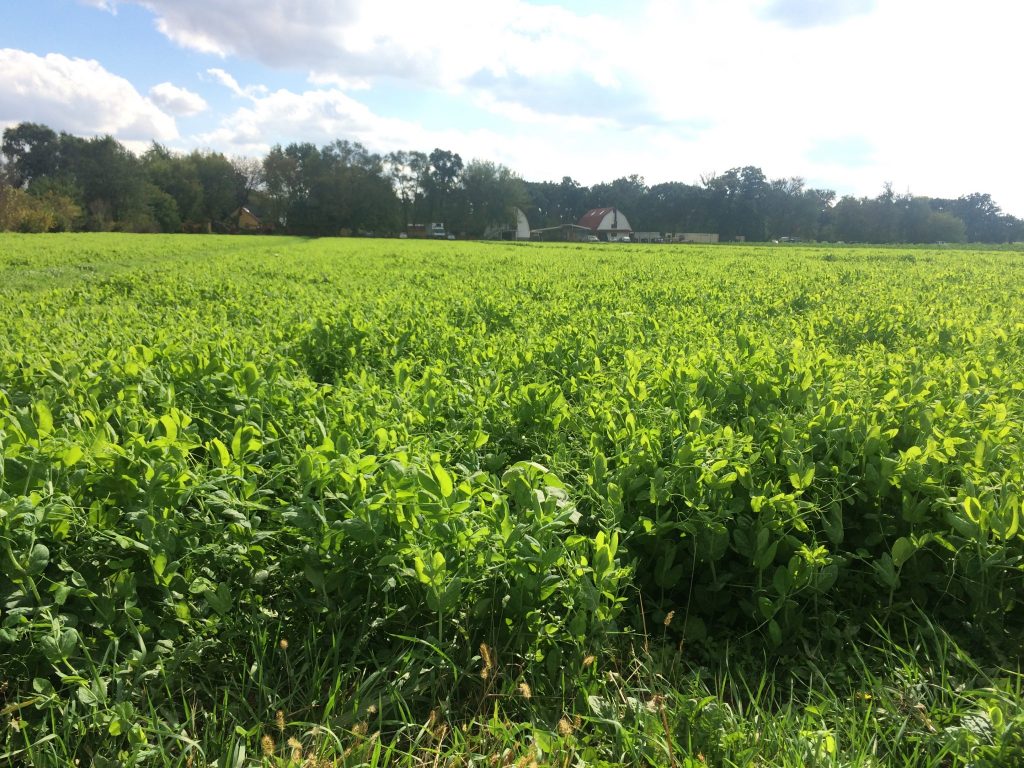
These forage peas will provide nutrients and microbial life where next season’s lettuce will grow—a great organic method for creating soil fertility.
Organic Inspection Inspection
This Thursday, we have our annual organic inspection. We spend a lot of time preparing for the visit. It takes a few hours for the inspector to walk the fields and review the records of crop placement, seed sourcing and field inputs. This year, an inspector will inspect the inspector, to make sure he is doing his job properly. (This reminds me of a hotel stay in Amsterdam, when, after my room was cleaned, a supervisor came to my door and asked if my room had been cleaned properly. A few minutes later, another supervisor came to my room and asked if a supervisor had come to my room to ask if it had been cleaned properly. I kept waiting for the next knock.)
We were certified organic in the early 90’s. An inspector came to inspect us one spring and that day we had sickly pepper transplants on a wagon. The inspector was clearly suspicious and was determined to find a toxic substance hidden somewhere on the farm to prove that we had violated the peppers and therefore had violated the organic rules. He spent hours and hours looking for the suspected prohibited substance–under tarps, in shadowy corners of the farm buildings, and in our closets. He scrutinized our barn lofts. He pulled things off of the fronts of deep shelves, and I believe he used a flashlight to peer into their recesses.
We were sad that we had sick peppers. We were still new at growing vegetables. We weren’t sure what we had done wrong. We were also sad that this inspector, rather than being sad with us, was exceedingly suspicious. He could not find a toxic chemical, so he finally gave up and left, after taking up almost a whole day of our precious farming time.
I was so offended by this inspector’s methods that I did not certify organic again for many years. (We queried our shareholders at the time to see how they felt about our not being certified organic, and 99% of the respondents said there was no need to certify–they trusted us.)
I encountered this inspector 15 years later when I was presenting at the Organic World Congress in Turin, Italy. I had last seen him on my farm 15 years earlier, looking for trouble. In Italy, we just stared at each other. I almost said, “do you trust me yet?” I didn’t say it.
I followed the organic guidelines during those years that I was not certified. I believe that a rule came out then that I couldn’t say I was organic unless I was certified, even if I followed the organic guidelines. I think it was even prohibited for me to claim I was following the organic guidelines, unless I was certified. This was quite a quandary. Was I supposed to say I didn’t follow the organic guidelines, even if I did, because it was a violation of organic regulations to say that I followed the guidelines unless I was certified? “Hey, Farmer John, do you farm organically?” “Um…um…unh…I’m not supposed to say.”
When the film The Real Dirt on Farmer John came out, some people immediately scrutinized the Angelic Organics website to see if we claimed we were organic. Somehow, in our earlier quest to delete every reference to organic from our web site, one lone reference to organic had survived, prompting the film posse to report me to the USDA. The USDA subsequently wrote me and threatened me with fines and sanctions unless the word organic was removed immediately. Fine, I removed it. We still followed all the organic rules, but we still couldn’t say that we did. (I suppose now that I’m certified, I can legally retroactively claim that I was organic back during those years when I wasn’t certified.)
A few years later, the USDA pounced again.
I am positive that any farm with the name Organic in it was to be grandfathered in and allowed to keep its name when the organic regulations were taken over by the government. I remember reading this clause carefully and thinking, well, good, we can keep our name and we will still therefore be regarded as organic, which we are, in essence, though we can’t say we are…but our name implies that we are, which they are letting us keep. It’s plain as day.
I received a letter from the USDA:
Mr Peterson, Certify organic, or change your name, or we’ll fine you $7,000 per day.
I searched and searched to no avail: every trace had been removed from the records of that grandfather exemption that allowed a farm to keep organic in its name, if it had had that name before the USDA took over the organic regulations on behalf of the American people. This was a re-write of history. The exemption was gone, eradicated, expunged…
I mulled over a farm name change: Angelic Organix? Angelic Organicks? Angelic Orgonne? Angelic Orangutang?
I certified organic. That was a few years ago.
Though it doesn’t show up in my bank account, I am technically saving $7,000 a day, by not paying the fine to our Department of Agriculture for choosing a name that implied my farm was organic, back when it was okay to do that.
The inspector comes Thursday, with his inspector.
Let us Know
Let Shelly know anything you’d like to share about this week’s box at email hidden; JavaScript is required. Please note the week and day of delivery, your site, when you picked up your box, and any comments about your box.
Please Fold Your Boxes Properly and Return Them
The farm re-uses the vegetable boxes. Flaps are easily torn when the boxes are dismantled improperly, and then the box bottom might later burst open with fresh, organic local produce heading towards the floor. Please carefully flatten your box and return it to your delivery site. If you receive home delivery, place it in the location where your box is delivered.
More from Shareholders
Visit us often at www.facebook.com/angelicorganics where we post exciting farm developments regularly, and shareholders post recipes, reviews tips, and photos. If you’re inspired to write a review, please do. We like knowing how our shareholders are experiencing the season.
Adventures at the Angelic Organics Learning Center
Angelic Organics Learning Center is an exciting and engaging place to learn about food, farming, and caring for the earth. Sign up for a hands-on farm workshop now at www.learngrowconnect.org/events
Warmly,
Farmer John
-
[…] Down I wrote about the Brussels sprout tardiness in the Week 19 issue of Farm News. The sprouts have still not fully developed. Normally, we put Brussels sprouts in boxes the last […]
[…] Organic Inspector Wrote In Farm News Week 19, I wrote about the Organic Inspection. The following are some of the notes that the inspector […]
Leave a Comment
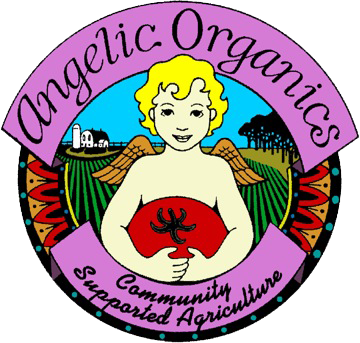
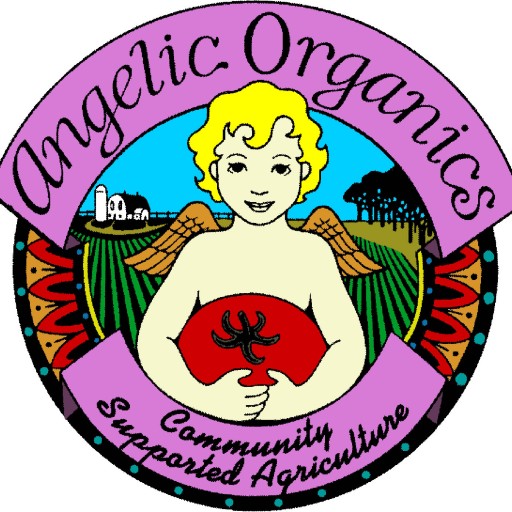
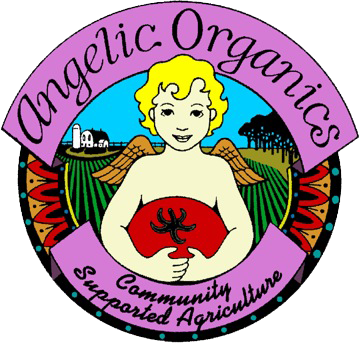

John, I remember those early days and the vote to decide whether you stay certified. I remember all the shareholders agreeing to put their trust in you and the farm. It was a good decision then and still is to this day. I’ve watched the farm grow and change and nourish thousands of families over the years. The employees of the farm take home more than a paycheck and give more than their time. Angelic Organics is more than a farm; it’s a community!